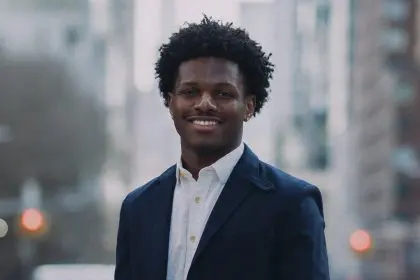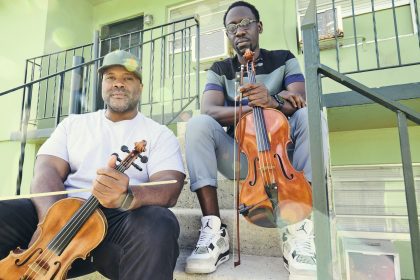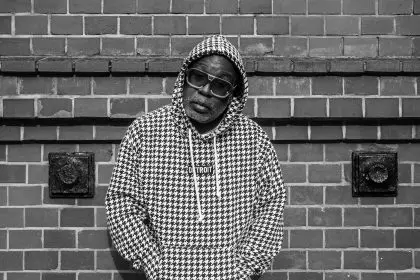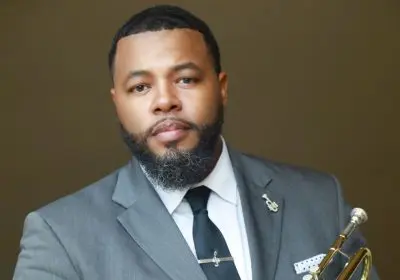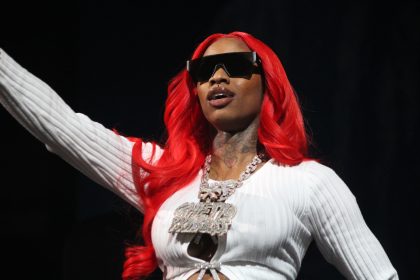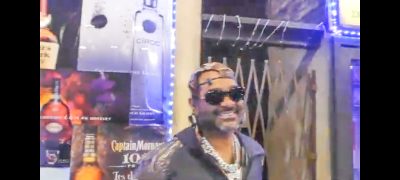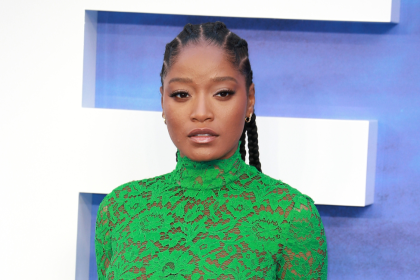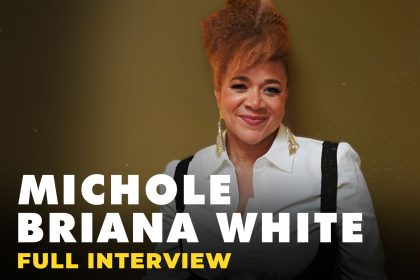From watching his father perform with jazz luminaries as a child to producing for hip-hop royalty, Karriem Riggins has spent his life at the intersection of musical worlds. The Detroit native, who left high school in the eleventh grade to join Betty Carter’s Jazz Ahead band at just 17, has since become one of music’s most versatile forces – equally at home behind a drum kit with jazz legends or crafting beats for contemporary hip-hop stars.
This spiritual connection to rhythm started early, as young Karriem absorbed the sounds of his father Emmanuel Riggins’ rehearsals and recordings with artists like Grant Green and Marcus Belgrave. That foundation in Detroit’s rich musical heritage, where players routinely crossed between jazz, funk and soul, helped shape Riggins’ boundary-breaking approach to music. His deep understanding of Detroit’s legacy, where musicians could seamlessly transition between jazz and funk, informed his genre-defying style.
Today, Riggins embodies that versatility, having performed or recorded with an astonishing range of artists from Oscar Peterson and Paul McCartney to Kanye West and Common. His work spans film scores, Grammy-winning productions, and groundbreaking solo albums that defy categorization. When asked to describe his musical palette, he simply says: “It’s the kaleidoscope, really. It’s everything.”
What does music mean to your life?
Music is everything. It’s therapeutic to me. It’s how I eat. It’s my life support. And it’s also the way I channel God. I feel like God lives in the music. So, I’m doing it and I feel like there’s a message in everything that I do.
When you first heard music, what touched you and what made you say that this is your life blood?
The rhythm was the initial feeling that I got from music. The heartbeat and the pulse of the drummer. And then harmony, hearing chord progressions and even classical music, but like jazz music from an early age, listening to my dad’s records and being around rehearsals, that just captured my whole soul. And I’ve been into it since then.
What was your development affected by being in the room of a session by some greats?
Being in the room is just very highly influential, especially at a young age. That’s setting the bar so high. So, when I started to play my instrument, I knew exactly how to get to where I needed to go. And I knew I needed to practice to get to that level of artistry. And we never master our instrument, but I just feel like the masters that played before us, we study them, and we try to strive to be as great as they are. That’s the feeling I got, is just always trying to get to that level of what I initially heard. That first sound is like the first high.
What does collaboration mean to you with other artists?
Other artists’ collaborations, especially with like-minded artists, is someone adding something that you necessarily wouldn’t have thought of, but it’s in the same kind of vibe that you would want to create. I’ve been blessed to work with people that I don’t have to say a word. It’s like they add something to my beats or even playing live, something that touches my soul and it vibrates with what I do. And I feel like that is what I pray for is to work with people who add on in the collaborative.
If you could talk to your younger self from 10 years ago to now, what would you say to him that you really didn’t understand as you were growing in these last 10 years?
To not really care about what people think about what you’re doing because when I got on the scene, it was a lot of people playing jazz, but it wasn’t a lot of people crossing genres at the time. And I feel like everyone is crossing genres. But now it’s accepted. But then it was more so like, if you’re doing hip hop, you can’t do jazz. If you’re doing jazz, you can’t do R&B or whatever. And I feel like there were like genre police at the time. And a lot of the articles you would read, it was kind of downing certain people who would cross genres. I would just say to my younger self is to not pay attention to any of that. And I feel like just be yourself and be true to what you believe in.
Growing up in Detroit where Black art, Black voice are the muscle, the knowledge of self that is emulated out of the city, what did it give you that you take around the world?
I got a lot of love from a lot of the masters here like Marcus Belgrave and my dad and my bigans and Roy Brooks and Lawrence Williams. All of the masters here spread love. And I feel like that is what I take when I go abroad and go to other cities is that same love that I got to spread it.
What makes Motown something that has stood the test of time sonically?
One thing about Detroit, what made the musicians here so special is that a lot of the musicians didn’t only play funk and soul, they played jazz. They could do a jazz gig and cross genres. And I think that that’s a beautiful thing. And then in the studio, a lot of the recordings were so genius with the mic placements. Where they placed the mics on those records was strategic. Like they had a sound, James Jamerson’s bass sound, it’s a special sound where he had his amp and some of the notes were overdriven and Pistol Allen on drums and the drum fills and everything just had, it was, you can break it down to a science. And that’s what’s so special about Detroit and Motown.
What do you think Robert Glasper offers to the menu of music now?
I think Robert is so special because just like we are what we eat. When you listen to, you have a wide palette of just listening to different things from classical to Afrobeat to soul, R&B. You know, that is what you are going to play and master. And I feel like the people who are listening to music now, we are all children of listening to various things, and he’s speaking, he’s able to speak to all these different people, different nationalities, and go to different countries. And it makes it special. It’s so special.
How do you feel about the connection happening now with the Afrobeat movement?
I feel like it’s so special because it’s bringing back just some of the rhythms from reggae, some of the rhythms from the actual Afrobeat, which was a genre before this current Afrobeat. I feel like this current Afrobeat is a fusion of other things, but you have like Fela Kuti and the movement that he started was the original Afrobeat that I know. And this new Afrobeat, you can hear a lot of other rhythms, Caribbean rhythms in there as well as African rhythms. And I feel like it’s special because that’s fused with different chord progressions and different genres of music over these rhythms, and it’s a great fusion. I think it’s very special.
How does DJing play a role in how you move?
DJing is special to me because it kind of helps me—it inspires me, first of all, to do beats. Like, I hear different things from the DJ perspective than what I would hear just on stage. Sometimes you pay attention to different things while DJing, and it’s helped me with even production sequencing. Like, you can sequence a record knowing what song to come next in a project is just as important as a party—knowing what song to play next, what people would really want to vibe to. And that’s important. I think the sequence of everything is important.
How would you describe the colors that you’re now making versus the colors that you started out making when you’re using yourself as an instrument of creating the visual now through sound?
I’m going to speak on colors. Actually, I won’t even say a particular color. I would say it’s the kaleidoscope, really. It’s everything because I’ve gone from playing with Oscar Peterson, Paul McCartney, to Kanye West and Common and Steve Lacey. So, I feel like those are—that palette of colors, there’s so many colors in there that I can’t make a definitive answer on a color, but it’s multi-colored.
What should a young person know when they get that call to be prepared to do when they’re in the room with somebody that is a superstar?
Be humble and be—these are things that I incorporate in my life myself. Just being in a room with people, I’m always a listener and wanting to learn more because we’re never—I feel like we never master what we do. We’re always a student of the art form. There’s always something to learn that’s more than you know. So, I think just being humble and accepting that will take you so far.
What has been said to you by a great that really moves you and made you understand that they saw something special in you?
Ray Brown, who I played with a lot of years, just pulled my coattail to being in tune with the instrument because the instrument will take care of you if you take care of your instrument. Whether it’s a drum machine, drums, trumpet, trombone, whatever it is, really practice and be one with the instrument because it will take care of you. And on the flip side, it was like while you’re doing that, also make sure, as musicians and artists, we take care of ourselves. Make sure we get enough rest, make sure you have health insurance and dental and all of that stuff that people don’t talk about—paying your taxes—because that could stress you out and make you go into ruts where you don’t want creative ruts. You want to stay forward motion. So, a lot of those talks were really important to me and that a lot of people don’t talk about that, especially young musicians. They don’t teach that in college.
Does that include things like publishing and the deal sheets while you’re in the room?
Absolutely. Making sure that you have a contract and you have the proper lawyer to look over the contract that explains. There’s even things, there’s cheaper ways to do it with AI, but there are apps that you can upload a contract and have it spit out all the bullet points of what’s important and what’s not good about the contract and things like that. There’s ways to do with technology, ways to do all of this stuff in your favor.
How do you stay curious from a musical standpoint?
I think taking breaks is important too. Like taking a step back away from what you’re listening to, what you’re doing will give you a kind of refreshed look, outlook on what you’re doing. And I take breaks, I take nice breaks sometimes, and when I go back in, it’s almost like a new beginning, it’s a resurgence of energy and style.
If you could make music for a particular type of movie, what genre would that be?
I’ve done some movie soundtracks for—we’ve done a comedy show. I just finished one actually for Mo Amher. I scored it with my brother Common and Patrick Warren. That’s coming out on Netflix soon. And I’ve also done dramas. I think I would want to do something more in a drama realm, being that a lot of those chords are minor chords and vibe, a lot of vibes.
What do you imagine the musical future will be with AI technology?
I think it’s all great, man. Just the way to do it where it makes sense and is original, as long as it’s not taken from original sources and not being credited. But I think there have been machines, like a lot of the stuff that was created in the 80s, that Herbie and Stevie Wonder started to incorporate their music, had preset chord progressions and you buy a drum machine and it already has 10 presets. And patterns on there that a lot of people use, that’s kind of assimilating an AI type of a thing, and it’s already done, and it’s just about how you manipulate it and use it in a creative way. And I think there’s creative ways to add on to the art form, even with AI.
What does Stevie Wonder mean and how does he make you feel?
Stevie, I feel like he’s the greatest. And I had the opportunity to work with him a couple times and produce a couple songs that he sang on one and played harmonica on one. And it was just incredible going to his studio, Wonderland, in Los Angeles and just seeing how he works and his drum setup and his creative process was amazing. And then I recently just got a chance to go to one of his shows for the first time. I had never been to a Stevie show until last month. He was just on this last tour, and I just felt so many emotions from song one to the end of the show. It’s like hit after hit and songs that remind me of my youth and how I felt at the time. And it was so special, man. I just felt like he is actually the greatest of all time. And I don’t know anyone who could rock a show like that. And I don’t even think he did all of his hits. I mean, we were there for two hours and he still left out probably another three hours worth of hits. So yeah, he’s the greatest.
Who are some of your favorite songwriters and why?
Stevie Wonder is probably one of my favorites. There are some younger writers that I really love too, like Steve Lacey, who’s a great artist. I love his songs. And then I go through different generations. There’s so many different generations of music. I go to jazz, Elvin Jones. It’s a great writer and drummer. John Coltrane—”Love Supreme” is one of my favorites. And I feel like that led me down the road to really like reading the Bible. Like, that made me want to read the Bible and kind of listen to that album while reading the Bible helped me kind of understand some of the scriptures. I just feel like different writers and different projects will pull different emotions out of you.
How do you feel about what Terrence Martin is doing with music?
What’s dope about Terrence is that he’s crossing genres. He studied the greats. He can play straight ahead. He can play R&B, and he can produce. He’s doing everything that young artists aspire to do, and he’s setting the stand. He’s setting the bar high. And I think that that is touching music in a way that is definitely adding on to the art form. And that’s what we strive to do. I strive to add on. If I feel like I’m not adding on, I feel like I need to take a break, and that’s when you go and take those breaks to refresh the energy.
How would you describe Childish Gambino’s creative voice?
I’ve heard him do all types of music, and I feel like he hit a zone with the soul, man. Like, he did a record that he was singing on that definitely sounded like an extension of Parliament Funkadelic, but not copying that—it was an original sound. And I think he’s extremely special at different things. He’s multifaceted. I mean, the show Atlanta, I think it’s amazing how he incorporates music in that show, as well as just the way he’s creative with the writing of the show and everything. So yeah, he’s all-around genius.
Where do you see Alex Isley in five years?
She’s one of the greatest. I met her through my boy, Common, and we actually talked about doing some music. We gotta connect, but she is definitely one of the pioneers of the music, and her voice is going to be—is just as important as any other pioneer, and I feel like she’s definitely important. And just having her—she’s in her family—I feel like that is something that when you have a father or mother that is such an icon, for her to take it to a whole other place, and you can’t even really connect that because she has her own special soul, is beautiful.
How do you define being an artist like Erykah Badu and yourself?
I feel like Erykah does so many different things, not only singing but just creating a brand of different things that’s in the art realm. I think she’s amazing at doing different things. Like I said, multi-prosy. And I think that is what we all strive to be—strive to do, is to be able to do these—all these things equally. And she’s amazing at it.
Why do you enjoy living in Atlanta?
I love it because it reminds me of a lot of Michigan. I grew up around a lot of trees, and I feel like the nature aspect of the state of Georgia is beautiful. I’m north of Atlanta, which is kind of in a city that’s in so many—which I’m right by nature trails and waking up with toads and turtles in the backyard. I just feel like that’s just a beautiful thing to be able to experience that.

